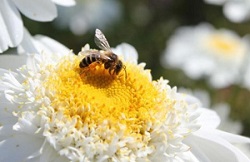Bees use a variety of senses and memory of previous experiences when deciding where to forage for pollen, research suggests.
The researchers believe pollen-collecting bees do not base their foraging decisions on taste alone, but instead make an “overall sensory assessment” of their experience at a particular flower.
Bees typically do not eat pollen when they collect it from flowers, but carry it back to the nest via special “sacs” on their legs or hairs on their body.
This makes it difficult to understand how bees judge whether the pollen a flower produces is nutritious enough for their young.
Indeed, researchers have been puzzled for a long time as to what exactly bees look for when they collect pollen from flowers.
Co-author Dr Natalie Hempel de Ibarra, expert in insect neuroethology, said: “It seems that bees don’t just respond to a single nutritional compound in pollen, such as crude protein content, but to a range of sensory cues in pollen and flowers.
“They also form memories for locations and types of flowers that they have visited which affect their foraging decisions.
“We need more research that considers the behaviour and neurobiology of bees to understand when and why they prefer some plants and some pollen over others.
The review examines existing evidence on how bees use their senses, previous experience and — in the case of social bees — feedback from the nest to decide where to gather pollen.
First author Dr Elizabeth Nicholls, a former PhD student and now a Postdoctoral Research Fellow, said: “Our review is unique in considering pollen foraging from an individual bee’s perspective, asking which senses bees use to decide which flowers are worth visiting.
“In our review we suggest that although bees may taste pollen during collection and use this nutritional information to guide their choices, they are also likely to pay attention to the strong odour and visual appearance of both pollen and the flower itself.
“For bees that live together in colonies, information passed on from the other bees in the nest, either via chemical cues or even special ‘dances’, may also be important in influencing their pollen-collecting behaviour.”
Source: Science daily
N.H.Kh

